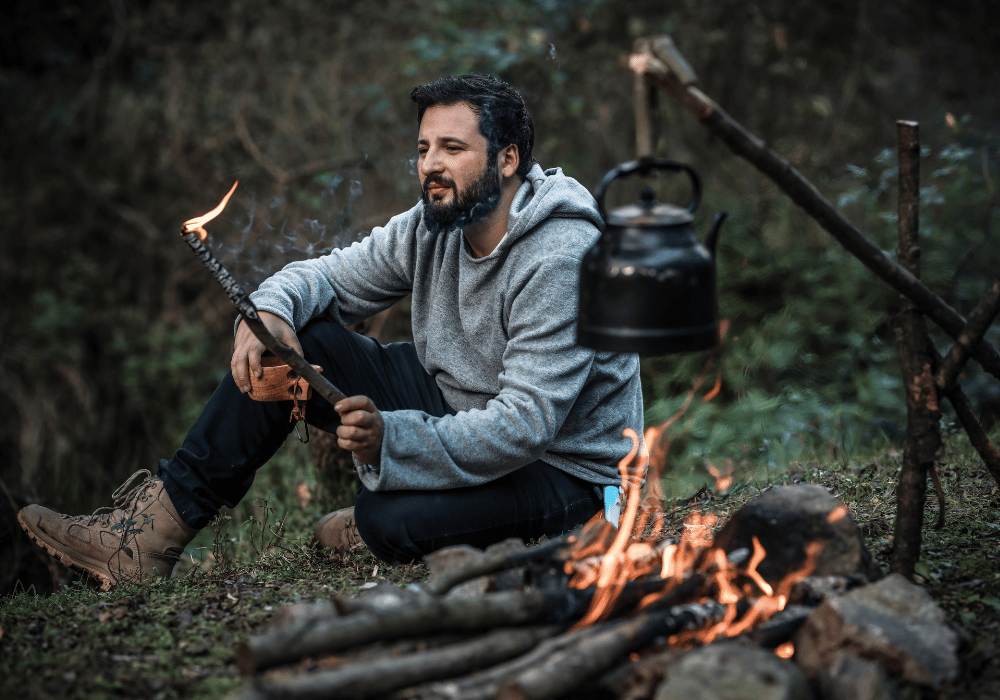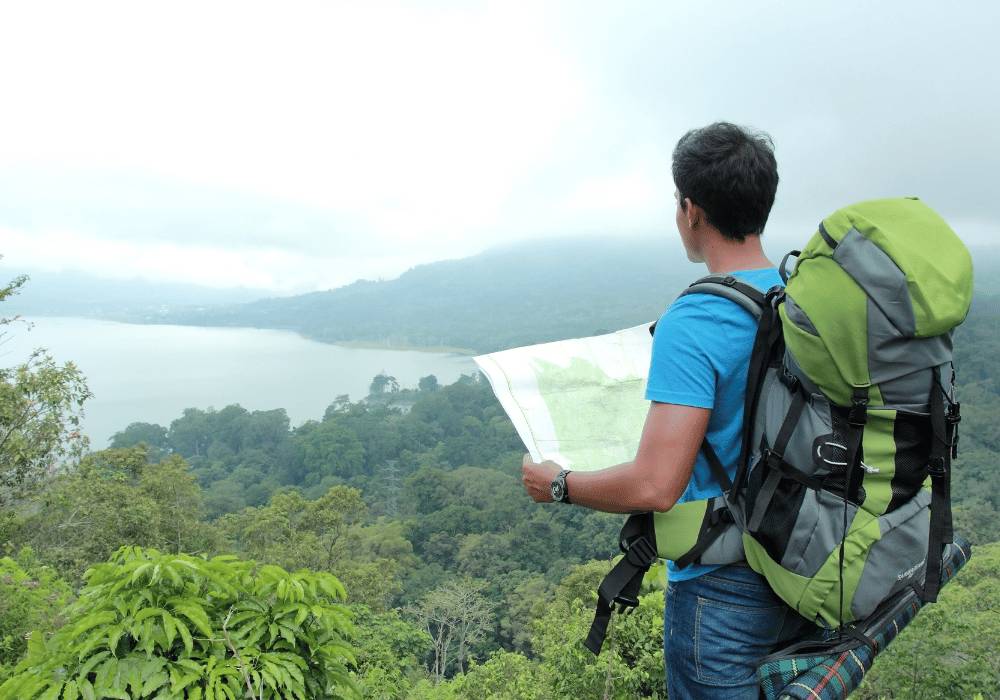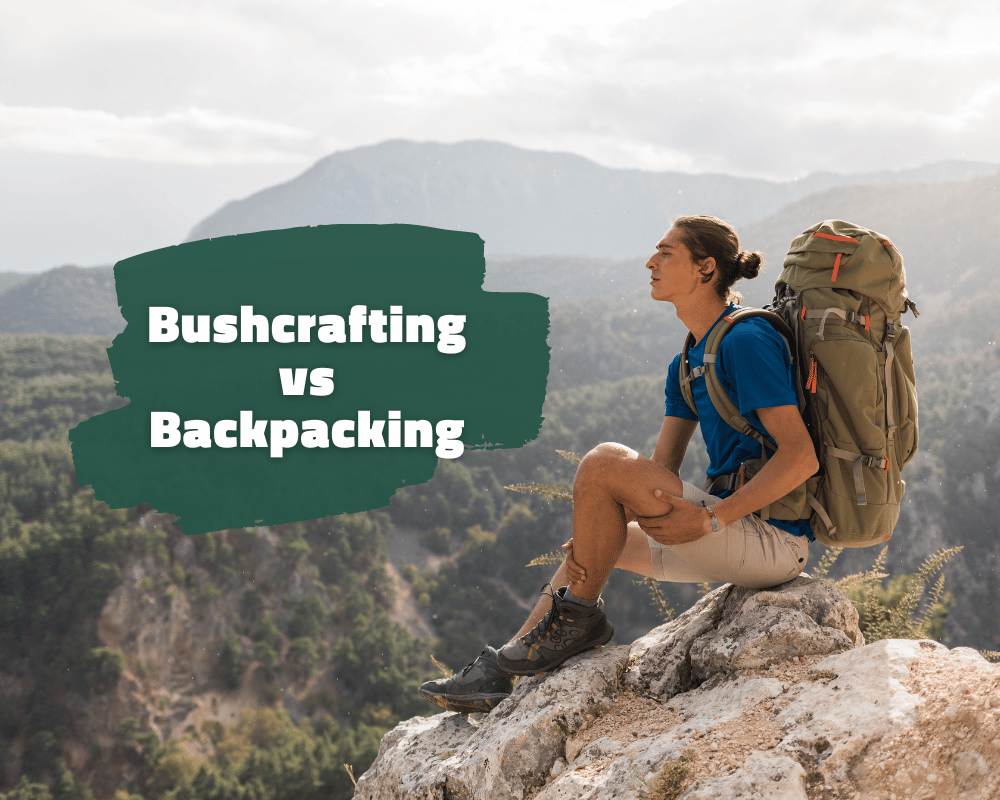Bushcrafting and backpacking are popular activities undertaken by lovers of the great outdoors. Both are challenging and require a great deal of preparation and knowledge; however, there are some significant differences between them.
In this article, we’ll show you the main differences between bushcrafting and backpacking—so that you can work out which activity is best suited to you!
The Main Features of Bushcrafting

Bushcrafting is a survival skill that involves using natural resources to sustain yourself while in the wilderness. It’s a way to reconnect with nature, learn new skills, and develop a deeper appreciation for the natural world. Bushcrafting can involve anything from starting a fire without matches, purifying water and finding food, to tracking wildlife and creating tools. All in all, the focus of bushcrafting is on survival and self-reliance, and the goal is to learn how to live off the land.
One of the most significant advantages of bushcrafting is the opportunity to immerse yourself in the wilderness. Unlike backpacking, which typically involves hiking from one place to another, bushcrafting often involves staying in one place for an extended period. This allows bushcrafters to build a deeper connection with the surrounding environment and to experience the natural world in a more intimate way. Additionally, bushcrafting can provide a sense of accomplishment and self-sufficiency that is hard to find in other outdoor activities.
However, one drawback associated with bushcrafting is that it can be physically and mentally challenging. It requires a great deal of preparation and knowledge. To successfully participate in bushcrafting, you must have a good understanding of survival skills—such as first aid, survival medicine, shelter construction, and navigating the wilderness. A lack of these skills can lead you to having a less successful, even dangerous, trip as there are many hazards out in the wild—be it wildlife, poisonous plants, or unpredictable weather.
The Main Features of Backpacking

Backpacking is a form of low-impact, long-distance hiking that involves carrying a pack with all the necessary supplies for a multi-day trip. The focus of backpacking is on exploring new environments, enjoying scenic views, and spending time in nature. Backpacking typically involves hiking from one place to another, with the aim of reaching a particular destination or completing a specific trail.
One of the main benefits of backpacking is the opportunity to explore new environments. Unlike bushcrafting, which often involves staying in one place for an extended period, backpacking lets you cover a significant amount of ground, discovering new landscapes and experiencing different parts of the natural world. Additionally, backpacking can provide a sense of accomplishment and challenge, as you push yourself to complete longer hikes and explore new, more difficult terrains.
Like bushcrafting, backpacking requires you to carry a heavy backpack, which can be physically demanding. And it can, in fact, be even harder as a backpacker, as you’ll be continuously carrying your pack over long distances. This can result in muscle strain, fatigue, and even injury. Backpacking is also mentally challenging in the sense that you have to plan routes carefully and prepare food and equipment meticulously so that you won’t get lost or run out of supplies. This requires acute attention to detail.
Bushcrafting vs Backpacking: Which is Right For You?
When choosing between bushcrafting and backpacking, it’s worth taking your personal preferences and abilities into account. What kind of adventure are you looking for—and, importantly, do you have the right skills for the trip?
If you’ve learned about survival skills and are keen to put them into practice, bushcrafting is a great choice for you. It involves a lot of manual labor, e.g. chopping branches and wood, so if you’re physically fit and enjoy that kind of work, you’re bound to enjoy a bushcrafting trip.
On the other hand, if you’re more interested in keeping moving on your trip, navigating trails and discovering new locations every day, then backpacking is probably the better choice. As long as you plan out your kit well and are fit to carry it, you should be good to go.
Another factor to consider is price. Both activities can be expensive, but backpacking gear tends to be more costly. Many bushcrafters get by on more basic and minimalist kit, keeping in line with the ethos of getting back to nature. Backpackers, meanwhile, might prefer gear that’s more durable (and therefore pricier).
Conclusion
Bushcrafting and backpacking have some things in common—they both require preparation, physical and mental endurance, and an appreciation for nature.
That said, there are big differences between the two pursuits. Bushcrafting focuses on survival skills and self-reliance in the wild, while backpacking is centered on carrying a backpack over new environments and completing a trail.
Ultimately, the choice between backpacking and bushcrafting is down to you, your skills, and your preferences. If you’re unsure, why not have a try at both! It’ll be a great learning curve for you.
I am Bruno. Navigating the urban rush by day, I find peace under the stars by night. Alongside my loyal companion and co-adventurer Lilith, we explore the balance between city life and nature’s embrace. Through writing and films, I delve into bushcraft and the wild’s allure.
GointheWilderness is my bridge between these two realms, guiding you to reconnect with your innate wilderness.
Eden is here and now; join us in rediscovering it.

